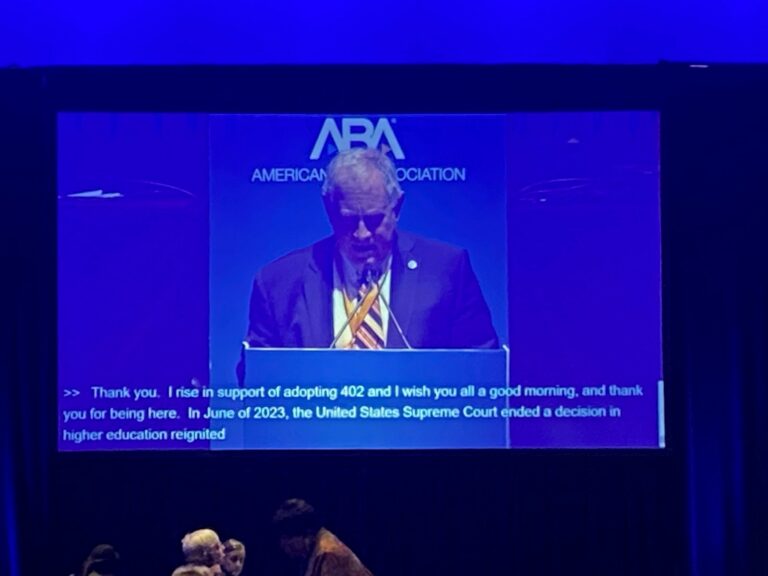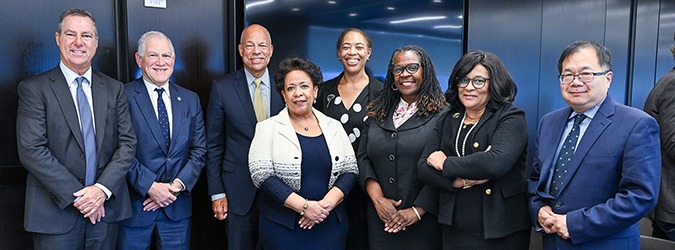ABA House of Delegates Adopts New York State Bar Association Report on Advancing Diversity
2.5.2024

The American Bar Association’s House of Delegates today adopted a New York State Bar Association report advising colleges, graduate schools, law firms and other businesses how to maintain diversity in the wake of the U.S. Supreme Court ruling on affirmative action.
“The report lays out a blueprint for how we can continue the important work of diversity, equity and inclusion within the new framework established by the Supreme Court,” Richard Lewis, president of the New York State Bar Association, told the ABA House of Delegates today. “It is not, of course, the final word, but rather the start of a long and ongoing effort that will continue to be refined over time as circumstances change and new challenges arise.”
Lewis also noted in his remarks to the ABA that the legal community has made some progress diversifying its ranks but it hasn’t been enough. According to the ABA’s 2023 profile of the profession, almost 90 percent of lawyers were white in 2013 compared to 79 percent last year.
“We know that increasing diversity is critical to improving access to justice,” Lewis said in his speech. “Among other things, attorneys who represent a broad array of viewpoints, life experiences, and backgrounds can better connect with and represent their clients – particularly those who are members of communities of color that are disproportionately involved in the criminal justice system.”
Mary Smith, president of the American Bar Association, urged members of the House of Delegates to approve the report.
“Improving diversity in the legal profession must be a collective effort, and this report rightly recognizes that accomplishing this requires a far-reaching approach that encompasses all the facets of our community,” she said.
“This undertaking resonates deeply and personally with me,” Smith added. “As the first Native American woman to lead the ABA, I have firsthand experience of how critical it is to open doors and provide opportunities to underrepresented communities. It is only through such comprehensive and far-reaching efforts that true equity and diversity will be achieved.”
The Advancing Diversity report, which was approved by the NYSBA House of Delegates in November of 2023, is in response to the U.S. Supreme Court decision in Students for Fair Admissions, Inc. v. President and Fellows of Harvard College and Students for Fair Admissions, Inc. v. University of North Carolina. The court ruled in June that race-conscious admissions policies at the two universities are unconstitutional.
The New York State Bar Association Task Force on Advancing Diversity — chaired by former Homeland Security Secretary Jeh Johnson, former U.S. Attorney General Loretta Lynch and Brad Karp, chair of Paul, Weiss – examined the impact the U.S. Supreme Court ruling will have on colleges, law schools, corporations, law firms and courts. Distinguished task force members include the chairs of 16 major law firms, the chief legal officers of ten large corporations, five of New York’s eminent judges and the deans of Columbia and NYU law schools.
“The Students for Fair Admissions decision is today the law of the land and must be followed,” the task force said in its report. “The question now is where do those in higher education, business, the legal profession, and the judiciary go from here?”
The report recommends employing race-neutral strategies for achieving diversity at colleges and universities such as admitting the highest-ranking student at every high school in the state, considering a student’s socioeconomic status in admissions decisions, and factoring in the more difficult path to academic achievement a first-generation college applicant had to take. Increasing the availability of financial aid, providing diverse mentors, and targeting scholarships for low-income students could also help increase diversity.
“As we noted in the task force report, regrettably in 2023 it is still the impulse of many in America to self-segregate – where we live, where we worship and with whom we socialize.” Johnson said when the report was first released to the public in September. “For many generations of American teenagers, higher education has been the first opportunity to broaden their horizons by living, socializing and learning with those different from themselves. And over recent years diverse student bodies at colleges and universities have led to more diverse professions.”
Lynch, co-chair of the task force and now a partner at Paul, Weiss, said the task force moved extremely quickly to make sure that corporations and institutions of higher education did not dismantle lawful diversity programs that are still permissible under the U.S. Supreme Court ruling.
“The diversity, equity and inclusion initiatives that have been developed by corporations and colleges over the past several decades have become part of the fabric of our society because they benefit all of our society,” Lynch said. “A breadth of options remains for these organizations, who recognize that although talent is found throughout all our communities, equal opportunity is not. Our task force focused on this important issue because the American values of equity and fairness must be preserved.”
Corporations and Law Firms
The task force’s working groups on corporations and law firms examined the impact of the U.S. Supreme Court ruling on corporate diversity initiatives. They concluded that corporate diversity efforts continue to be lawful if the DEI programs comply with federal anti-discrimination statutes such as Title VI and Title VII of the Civil Rights Act, and 42 U.S.C. § 1981.
While DEI has been subjected to shareholder challenges, reverse discrimination litigation and government investigations, the report suggests weighing those risks against the downside of forgoing those efforts. Companies that abandon their public commitments can be subject to SEC investigations, shareholder derivative suits and discrimination actions.
“Law firms and corporations that fail to prioritize diversity do so at their own peril. They will lose the talent war, suffer financial consequences and fall behind their competitors,” Karp said. “Even more important, supporting diversity, equity and inclusion is the right thing to do, morally and ethically.”
Corporations can also turn to ideas that go beyond affirmative action such as pipeline programs, affinity or employee resource groups, fellowships, scholarships, mentorships, and sponsorships. These DEI efforts are targeted at increasing the number of diverse applicants and retaining diverse employees. Traditionally, such programs have been considered lawful under Title VII, the report states.
The Judiciary
The court system should encourage diverse candidates to apply, require bias training for judges, court personnel, and jurors; and work with bar associations and affinity groups to publicize pathways to becoming a judge. In addition, courts should recruit in communities with higher percentages of underrepresented groups and ensure that job postings are inclusionary.
“Plain language and inclusive wording in job postings can positively influence the diversity and inclusivity of applicant pools and promote fairer recruitment practices,” the report states. “Posting opportunities in LGBTQ+ centers, historically black colleges and universities, bar associations, fraternal organizations, faith communities, local colleges, career fairs and social media will also aid in attracting diverse applicants.”
Judges and court staff should also:
- Support measures that create equal opportunities for diverse attorneys to take on lead roles in their courtrooms.
- Ensure that they have clear policies and protocols for investigating claims of bias, harassment and discrimination.
- Display photographs, portraits, and artwork that convey the message that everyone is welcome.






